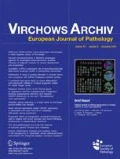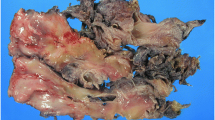Abstract
Aims
To report the clinicopathological and immunohistochemical features and longer term biological behaviour of aggressive angiomyxoma, an uncommon mesenchymal neoplasm occurring predominantly in the pelvi-perineal region of adults. Using immunohistochemistry, possible overexpression of CDK4 and MDM2 was analysed, which might point to (cyto)genetic alteration(s) in chromosome region 12q13–15, an area reported to be altered in this tumour entity.
Methods and results
Cases (n=11) of aggressive angiomyxoma were retrieved from the consultation files of the Comprehensive Cancer Centre of the Middle Netherlands (IKMN) panel for soft tissue tumours. Clinical and follow-up information were obtained, and immunohistochemical analysis was performed using antibodies directed against vimentin, cytokeratin AE1/AE3, desmin, α-smooth-muscle actin, CD34, S-100 protein, oestrogen receptors, CDK4 and MDM2. Five patients were female (age range 24–47 years; median 39 years), and six patients were male (age range 36–69 years; median 44.5 years). Of 11 cases, 10 arose in the pelvi-perineal area and 1 arose in the abdominal cavity in close relation to the bladder. Morphology was consistent with previous reports of this entity. Immunohistochemically, 8 of 11 cases were desmin positive (5 of 5 positive in females; 3 of 6 positive in males), 6 of 11 cases were positive for α-smooth-muscle actin, 5 of 11 cases were CD34 positive, 11 of 11 cases, irrespective of gender, were positive for oestrogen receptors and 3 of 11 cases were positive for cytokeratin AE1/AE3. Strong, diffuse nuclear positivity for CDK4 expression was present in all 6 cases tested, while only 1 of 11 cases tested for MDM2 showed weak focal positivity. Clinical follow-up in all cases (range 1–216 months; median 72 months) showed one local recurrence (9%) after 36 months. No metastases or tumour-related deaths were noted.
Conclusions
The sex distribution of cases reported in this study was roughly equal, in contrast to previous reports emphasising the predominance of this tumour in females. Our study confirms the local aggressive nature of aggressive angiomyxoma, although our local recurrence rate is lower than previous reports (9% versus 36–72%); no metastases and/or disease-related patient deaths were documented. All cases arising in females were positive for desmin, while three of the six cases arising in males were negative for desmin, supporting previous findings and indicating that the lesion may be somewhat different in males. The strong diffuse positivity for CDK4 in all six cases tested goes some way in implicating CDK4, either directly or indirectly, in tumourigenesis. The negative immunostaining for MDM2 would argue against functional amplification of this gene.



Similar content being viewed by others
References
Begin L, Clement P, Kirk M, Jothy S, McCaughey W, Ferenczy A (1985) Aggressive angiomyxoma of pelvic soft parts: a clinicopathologic study of nine cases. Hum Pathol 16:621–628
Betz J, Meloni A, U’ren L, Moore G, Sandberg A (1995) Cytogenetic findings in a case of angiomyxoma of the vaginal wall. Cancer Genet Cytogenet 84:157
Blandamura S, Cruz J, Vergara LF, Puerto IM, Ninfo V (2003) Aggressive angiomyxoma: a second case of metastasis with patient’s death. Hum Pathol 34:1072–1074
Fetsch J, Laskin W, Lefkowitz M, Kindblom L, Meis-Kindblom J (1996) Aggressive angiomyxoma: a clinicopathologic study of 29 female patients. Cancer 78:79–90
Giesselson D, Hoglund M, Mertens F, Mitelman F, Mandahl N (1998) Chromosomal organization of amplified chromosome 12 sequences in mesenchymal tumors detected by fluorescence in situ hybridization. Genes Chromosomes Cancer 23:203–212
Graadt van Roggen JF, Hogendoorn PCW, Fletcher CDM (1999) Myxoid tumours of soft tissue. Histopathol 35:291–312
Granter S, Nucci M, Fletcher C (1997) Aggressive angiomyxoma: reappraisal of its relationship to angiomyofibroblastoma in a series of 16 cases. Histopathology 30:3–10
Hazelbag HM, Mooi WJ, Fleuren GJ, Hogendoorn PCW (1996) Chain-specific keratin profile of epithelioid soft-tissue sarcomas: an immunohistochemical study on synovial and epithelioid sarcoma. Appl Immunohistochem 4:176–183
Hes J (1998) Chromosomal translocations in benign tumors. The HMGI proteins. Am J Clin Pathol 109:251–261
Horsman D, Berean K, Salski C, Clement P (1991) Aggressive angiomyoma of the pelvis: cytogenetic findings in a single case. Cancer Genet Cytogenet 56:130–131
Iezzoni J, Fechner R, Wong L, Rosai J (1995) Aggressive angiomyxoma in males. A report of four cases. Am J Clin Pathol 104:391–396
Kazmierczak B, Dal Cin P, Wanschura S, Bartnitzke S, Van den Berghe H, Bullerdiek J (1998) Cloning and molecular characterization of part of a new gene fused to HMGIC in mesenchymal tumors. Am J Pathol 152:431–435
Kenny-Moynihan B, Hagen J, Richman B, McIntosh D, Bridge J (1996) Loss of an X chromosome in aggressive angiomyxoma of female soft parts: a case report. Cancer Genet Cytogenet 89:61–64
Nucci M, Weremowicz S, Neskey D, Sornberger K, Tallini G, Morton C et al (2001) Chromosomal translocation t(8; 12) induces aberrant HMGIC expression in aggressive angiomyoma of the vulva. Genes Chromosomes Cancer 32:172–176
Schoenmakers E, Wanschura S, Mols R, Bullerdiek J, Van den Berghe H, Van de Ven W (1995) Recurrent rearrangements in the high mobility group protein gene, HMGI-C, in benign mesenchymal tumours. Nat Genet 10:436–444
Siassi RM, Papadopoulos T, Matzel KE (1999) Metastasizing aggressive angiomyxoma. N Engl J Med 341:1772
Steeper TA, Rosai J (1987) Aggressive angiomyxoma of the female pelvis and perineum. Report of nine cases of a distinctive type of gynecologic soft-tissue neoplasm. Am J Surg Pathol 7:463–475
Tsang W, Chan J, Lee K, Fisher C, Fletcher C (1992) Aggressive angiomyxoma. A report of four cases occurring in men. Am J Surg Pathol 16:1059–1065
Acknowledgements
The Comprehensive Cancer Centre of the Middle Netherlands, Utrecht, The Netherlands, under the auspices of one of the authors (J.A.M.vU) for the use of archival material. The following pathologists are thanked for their kind co-operation in providing the initial material and obtaining additional clinical follow-up information: J.R.J. Elbers, Saint Antonius Hospital, Nieuwegein; J.G. van den Tweel, University Medical Centre Utrecht, Utrecht; D.E. Israel, Lievensberg Hospital, Bergen op Zoom (two cases); C. van Heusden, Co-operative Hospitals East Groningen, Winschoten; U.G.J.M. van Haelst, Radboud Hospital/Nijmegen Academic Medical Centre, Nijmegen; M.C.B.J.E. Tutein Nolthenius-Puylaert, Elkerliek Hospital, Helmond; R.J.M. Parren, Rijnstate Hospital, Arnhem; A.N. van Geel and M. Wijngaarden, Daniël den Hoed Kliniek, Rotterdam (four cases). All experiments performed for this paper comply with the laws as stipulated by the appropriate regularity authorities in the Netherlands.
Author information
Authors and Affiliations
Corresponding author
Rights and permissions
About this article
Cite this article
van Roggen, J.F.G., van Unnik, J.A.M., Briaire-de Bruijn, I.H. et al. Aggressive angiomyxoma: a clinicopathological and immunohistochemical study of 11 cases with long-term follow-up. Virchows Arch 446, 157–163 (2005). https://doi.org/10.1007/s00428-004-1135-9
Received:
Accepted:
Published:
Issue Date:
DOI: https://doi.org/10.1007/s00428-004-1135-9




